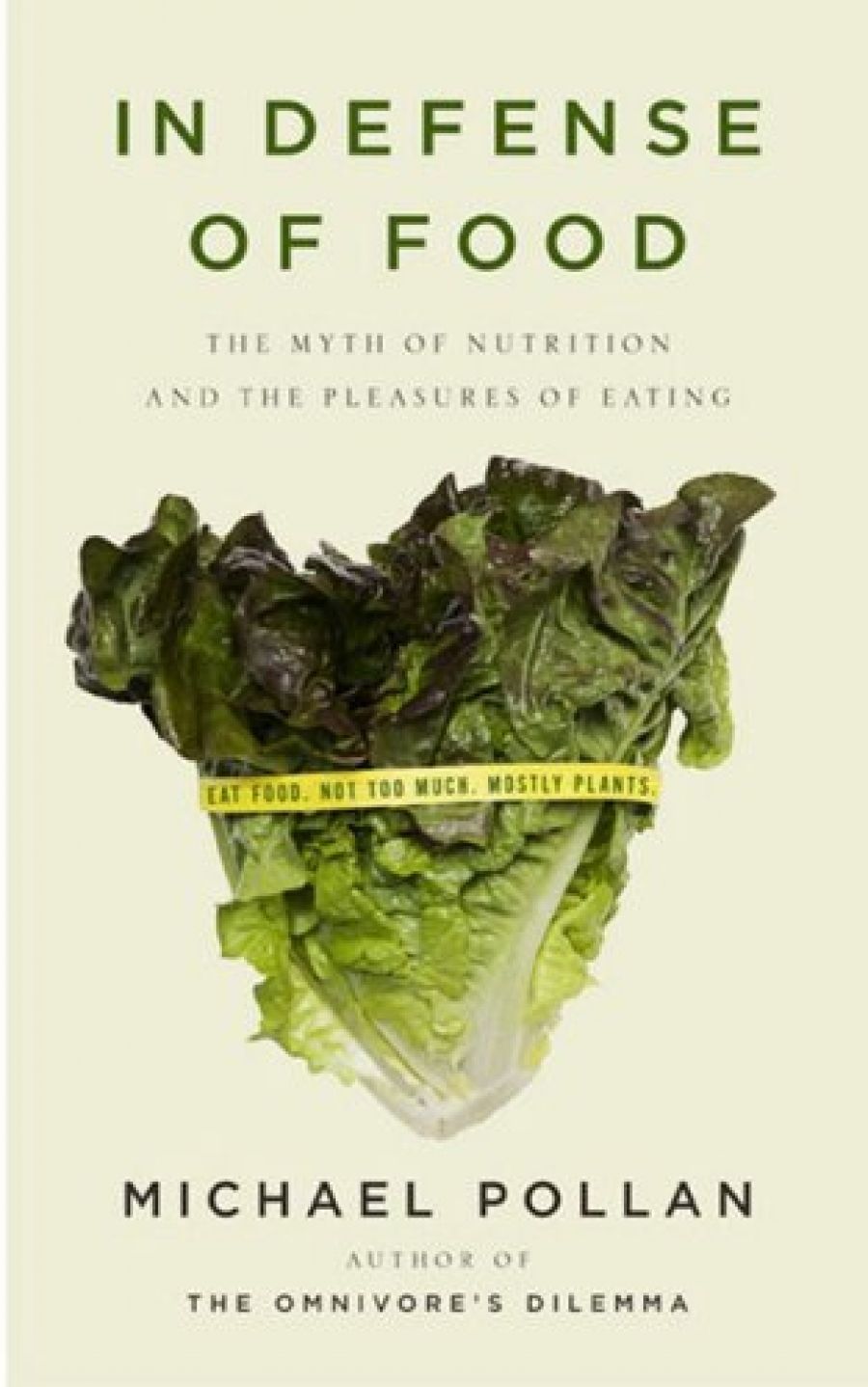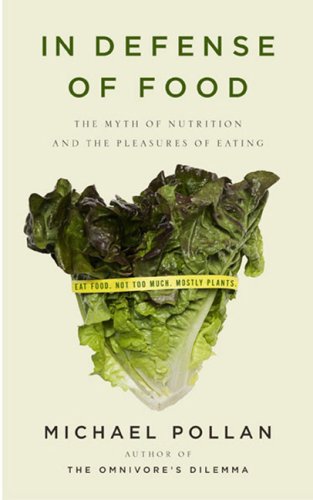
- Free Article: No
- Contents Category: Science and Technology
- Review Article: Yes
- Article Title: The orthorexic West
- Online Only: No
- Custom Highlight Text:
In Defence of Food is several books rolled into one. It is a primer on nutrition science, a contextual exposé on what we put in our mouths, an advertisement for the joys of eating and even something of a self-help diet and behavioural book. It is also part of Michael Pollan’s ongoing conversation with the reading (and eating) public, and is more satisfying when placed within his oeuvre, particularly The Omnivore’s Dilemma: A Natural History of Four Meals (2006).
Mostly, though, In Defence of Food is a polemic about ‘the problem of the Western diet, and how we might plot our escape from it’. Pollan even cites a shiny new eating disorder for us to worry about: an ‘orthorexic’ is a person ‘with an unhealthy obsession with healthy eating’. While Pollan writes about the United States, we only have to read the ingredient lists on our supermarket products, or reflect upon the controversy over the meat-heavy (or meat-rich, depending on your viewpoint) CSIRO diet books, to recognise the Australian relevance of the ‘Western diet’ debate.
- Book 1 Title: In Defence of Food
- Book 1 Subtitle: The myth of nutrition and the pleasures of eating
- Book 1 Biblio: Allen Lane, $32.95 pb, 256 pp
- Book 1 Cover Small (400 x 600):

- Book 1 Cover (800 x 1200):

Pollan begins with this maxim: ‘Eat food. Not too much. Mostly plants.’ This advice is hardly revolutionary. Marion Nestle argues that, while nutritional advice seems forever to be changing, the basic principles of healthy eating have remained constant for fifty years. These she summarises as ‘eat less, move more, eat lots of fruit and vegetables ... go easy on the junk food’ (What to Eat, 2006).
Still, In Defence of Food is distinctive for its evangelistic fervour, for the fact that Pollan is a communicator of rare erudition and wit, and because he uses language expertly to undermine readers’ assumptions. Take this deceptively simple statement, ‘Eat food’. Pollan argues that, ‘while it used to be that food was all you could eat, today there are thousands of other edible foodlike substances in the supermarket’. To ‘eat food’ suddenly becomes a task requiring considerable knowledge and persistence.
Pollan first sets out to skewer the scientists, food marketers and government agencies who have combined to promote ‘three pernicious myths’: ‘that what matters most is not the food but the “nutrient”; that because nutrients are invisible and incomprehensible to everyone but scientists, we need expert help in deciding what to eat; and that the purpose of eating is to promote a narrow concept of physical health.’ Underpinning all this mythology is the ideology of ‘nutritionism’, which, Pollan argues, assumes that ‘[f]oods are essentially the sum of their nutrient parts’. Nutritionism underpins a reductionist drive to isolate essential nutrients, which in turn buttresses the marketing-driven creation of a seemingly endless array of heavily refined and then nutrient-fortified ‘foodlike’ products.
Pollan then turns his attention to the failings of the Western diet: ‘people who eat the way we do in the West today suffer substantially higher rates of cancer, cardiovascular diseases, diabetes, and obesity than people eating any number of different traditional diets.’ Pollan bemoans the shift from whole foods to refined foods and the ubiquitous use of processed corn, soybeans, rice and meat. He argues that increases in food production quantity have adversely affected quality (‘you now have to eat three apples to get the same amount of iron as you would have gotten from a single 1940 apple’). Pollan’s critique of the Western diet is scathing, but too abbreviated. He is also a trifle repetitive (perhaps unavoidable in a polemic), and he heckles too often (deserving though the recipients may be).
The final section of In Defence of Food expands upon the maxim, ‘Eat food. Not too much. Mostly plants.’ The simplicity of these words itself offers an antidote to the daunting need for us to be forever disassembling food into its nutrient components, but it also brings a new set of rules. Pollan describes these as ‘eating algorithms’: ‘mental programs that, if you run them when you’re shopping for food or deciding on a meal, will produce a great many dinners, all of them “healthy” in the broadest sense of that word.’
Many of these rules, with Pollan’s explanatory commentary, seem both sensible and insightful: ‘eat like an omnivore’, he counsels, partly for health but also because ‘Biodiversity in the diet means more biodiversity in the fields.’ Other rules, however, have a take-em-or-leave-em quality: Pollan says ‘Try not to eat alone’, partly because ‘for people prone to overeating, communal meals tend to limit consumption’, but also because ‘the shared meal elevates eating from a mechanical process of fuelling the body to a ritual of family and community’. But eating alone – in private or public – can be a glorious pleasure as well as a necessity. Still, Pollan’s rules are a vital part of the book: in pleading for a fundamental change of mindset, he at least begins to propose alternatives.
In Defence of Food is crammed full – at times too full – of observations, revelations, and big ideas. Pollan sets out simultaneously to convince, entertain and inform, unpacking highly complex and technical issues without oversimplification. It is a writerly achievement, although the prose has a somewhat serrated quality in contrast to Pollan’s most graceful work. For instance, there is nothing quite as beguiling, lucid or authoritative as his stunning – and still politically charged – exploration of the apple in America (see The Botany of Desire: A Plant’s-Eye View of the World, 2001). His solutions are not simple or quick or inexpensive or comprehensive, but In Defence of Food is still a compelling ‘eater’s manifesto’.


Comments powered by CComment